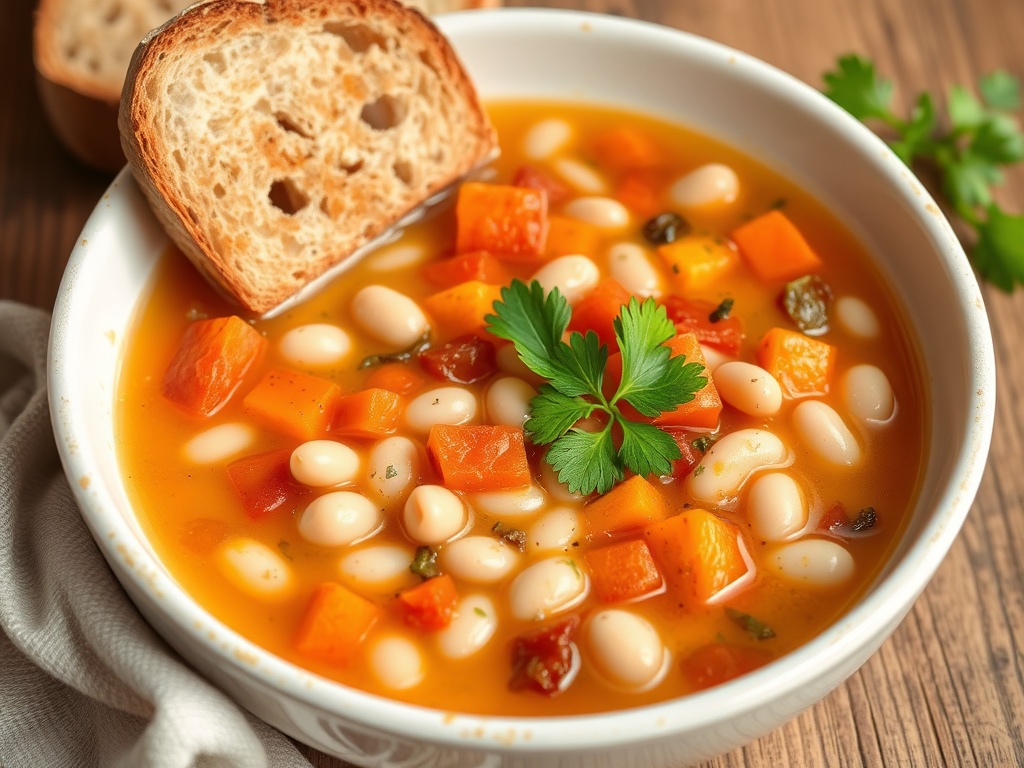
Fasolada, often referred to as the national dish of Greece, is a hearty bean soup that embodies the essence of Greek cuisine. Rich in flavor, nutritious, and easy to prepare, fasolada is not only a staple in Greek households but also a symbol of the Mediterranean diet. Its humble ingredients and comforting nature reflect the spirit of Greek cooking—simple yet deeply satisfying.
Origins and History
The origins of fasolada can be traced back to ancient Greece, where beans were a significant part of the diet. In classical times, legumes were revered for their nutritional value and were often featured in various dishes. The dish itself is thought to have evolved over centuries, influenced by various regional ingredients and cooking techniques.
In the 19th century, fasolada became particularly popular among the working class, as it was a nourishing meal that could be made with inexpensive ingredients. Its accessibility made it a beloved dish across all social classes. Many families have their own unique recipes, passed down through generations, showcasing the dish’s adaptability and regional variations.
Ingredients
Fasolada is primarily made from:
- Beans: Typically, large white beans (like cannellini or navy beans) are used for their creamy texture.
- Vegetables: Onions, carrots, and tomatoes are common, providing a rich base for the soup.
- Olive Oil: A staple in Greek cooking, olive oil adds depth and flavor.
- Herbs and Spices: Oregano and parsley are traditional, while some might add bay leaves or thyme for complexity.
- Salt and Pepper: Essential for seasoning.
Optional Ingredients
Some variations may include:
- Celery: Adds a crunchy texture and enhances the soup’s flavor.
- Garlic: For a more robust and aromatic taste.
- Lemon Juice: Brightens the dish and adds a refreshing acidity.
- Green Peppers: For a touch of sweetness and color.
Preparation
Preparing fasolada is straightforward, making it an ideal dish for both novice and experienced cooks. Here’s a simple method to guide you through the process:
- Soak the Beans: Start by soaking the beans overnight in water to ensure they cook evenly and become tender. If short on time, a quick soak method can be used—boil the beans for a few minutes, then let them sit for an hour.
- Sauté the Vegetables: In a large pot, heat a generous amount of olive oil. Add chopped onions and carrots, sautéing until they are softened and fragrant.
- Add Tomatoes: Incorporate fresh or canned tomatoes into the pot. If using fresh tomatoes, you might want to peel them first for a smoother texture. Allow the tomatoes to break down and mingle with the other ingredients.
- Combine Ingredients: Drain the soaked beans and add them to the pot, along with enough water or vegetable broth to cover them by a couple of inches. Bring the mixture to a boil.
- Season and Simmer: Add the herbs, salt, and pepper. Reduce the heat and let it simmer for about 1 to 1.5 hours, or until the beans are tender. Stir occasionally and add more water if needed to maintain a soupy consistency.
- Serve: Once cooked, drizzle with extra virgin olive oil and garnish with fresh parsley. Serve hot, accompanied by crusty bread or a side salad.
Nutritional Benefits
Fasolada is not only delicious but also packed with nutritional benefits. It is high in protein and fiber due to the beans, making it a filling meal that supports digestive health. The inclusion of vegetables adds essential vitamins and minerals, while olive oil provides healthy fats that are beneficial for heart health. Additionally, fasolada is naturally vegan, making it suitable for a variety of diets.
Eating fasolada can contribute to a balanced diet, rich in plant-based nutrients. The Mediterranean diet, which emphasizes whole foods like legumes, fruits, vegetables, and healthy fats, is associated with numerous health benefits, including lower risks of chronic diseases.
Cultural Significance
In Greece, fasolada is more than just food; it is a dish that brings people together. Often served during Lent and on Fridays, fasolada has deep roots in Greek tradition. It is commonly prepared for family gatherings, celebrations, and even during religious observances, highlighting its role in community and family life.
Fasolada also represents the Greek philosophy of using simple, fresh ingredients to create something truly special. Many families have their own variations, which may include unique spices or additional vegetables, showcasing the regional diversity of Greek cuisine. This adaptability allows fasolada to remain relevant and cherished, regardless of changing culinary trends.
Variations Across Greece
While the basic recipe for fasolada remains consistent, regional variations exist that reflect local tastes and available ingredients.
- Crete: In Crete, fasolada may be made with the addition of local herbs and sometimes even a hint of chili for a spicy twist.
- Thessaloniki: In Northern Greece, it might incorporate different types of beans or additional vegetables like zucchini or potatoes.
- Ionian Islands: Here, you may find fasolada with a touch of lemon or vinegar, enhancing its bright flavors.
Pairing Suggestions
Fasolada is versatile and can be paired with various sides to create a complete meal. Common accompaniments include:
- Crusty Bread: Ideal for soaking up the flavorful broth.
- Greek Salad: A refreshing side with tomatoes, cucumbers, olives, and feta cheese.
- Olives: A small bowl of assorted olives can add a salty contrast.
- Wine: A glass of local red or white wine complements the dish beautifully.
Conclusion
Fasolada is a testament to the beauty of Mediterranean cuisine, highlighting the importance of fresh ingredients and traditional cooking methods. Its rich history, nutritional benefits, and cultural significance make it a cherished dish in Greek culture. Whether enjoyed on a chilly day or shared with loved ones around the table, fasolada remains a beloved symbol of warmth and hospitality.
If you haven’t tried this delightful soup yet, it’s time to experience the heart of Greece on your plate. The next time you seek comfort in a bowl, consider making fasolada—it’s more than just a meal; it’s a connection to tradition and a celebration of community.



